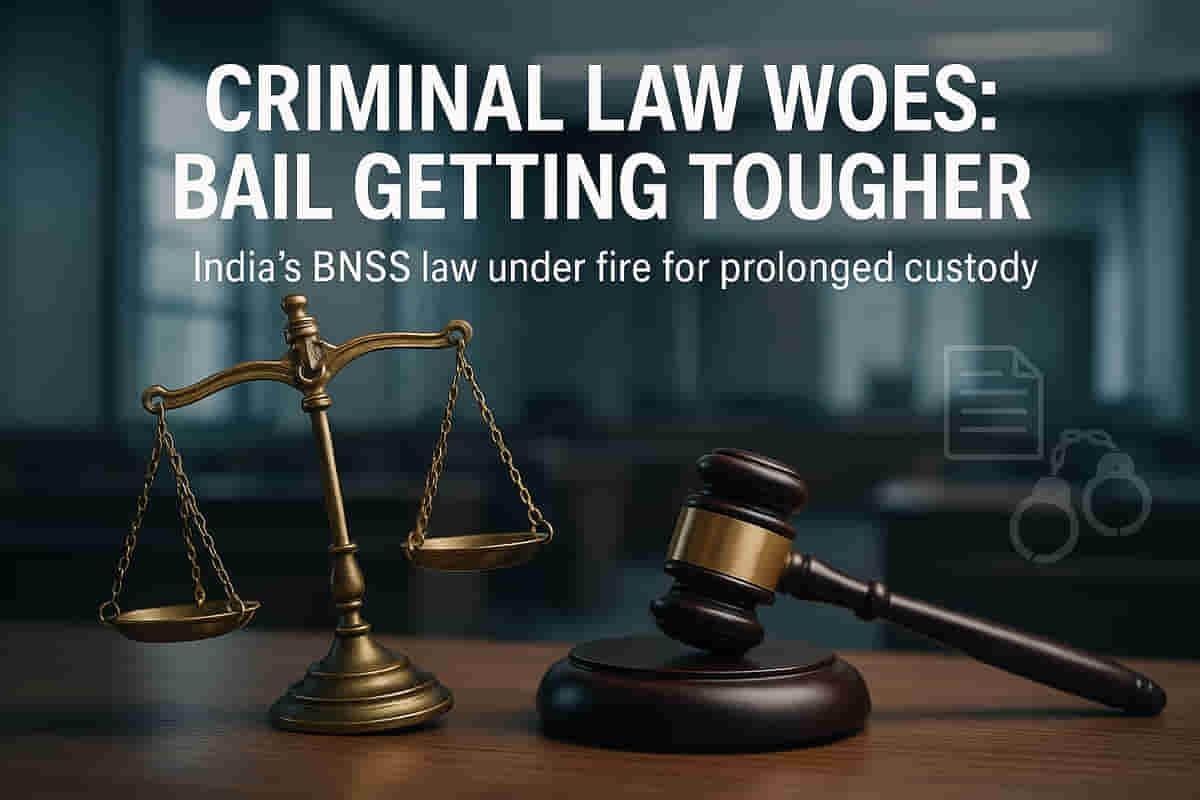India's New BNSS Law Criticized for Enabling Prolonged Custody and Hindering Bail
Law/Court
|
30th October 2025, 2:09 PM

▶
Short Description :
Detailed Coverage :
The Bharatiya Nagarik Suraksha Sanhita (BNSS), India's new criminal procedural law, is under scrutiny for allegedly failing to deliver swifter justice and instead creating mechanisms for prolonged pre-trial detention. A key concern is Section 187(2) of the BNSS, which allows for "intermittent police custody" totaling up to 15 days, spread over the initial detention period. This differs from the older Code of Criminal Procedure (CrPC), which generally allowed a single 15-day stretch of police custody.
This intermittent custody allows investigative agencies to repeatedly seek police custody, even after initial interrogation, primarily to scuttle bail applications. When an accused person is eligible for bail, agencies can apply for further police custody, claiming ongoing investigation needs, thereby extending detention and delaying the bail process. This practice is referred to as a "custody trap."
The article contrasts BNSS unfavorably with the United Kingdom's Police and Criminal Evidence Act (PACE) and Magistrates' Courts Act (MCA). In the UK, pre-charge detention is strictly limited to 96 hours, with extensions requiring rigorous judicial approval. Post-charge remand is capped at three days. BNSS's extended custody periods are seen as less protective of individual liberty.
For cases involving financial crimes, such as those handled by the Enforcement Directorate (ED) or Central Bureau of Investigation (CBI), this prolonged custody mechanism is often exploited. Accused individuals can be arrested in new cases just as chargesheets are about to be filed in old ones, creating an endless cycle of custody. Courts are also noted to be reluctant to grant bail, increasingly denying it based on the gravity of the offense rather than traditional bail tests.
Securing regular bail is difficult. Default bail, available if a chargesheet isn't filed within 90 days, is often blocked by agencies filing incomplete chargesheets. While a recent Supreme Court judgment in Ritu Chabbaria v. CBI offered hope by stating incomplete chargesheets cannot defeat default bail, its implementation is uncertain due to previous conflicting rulings.
Landmark rulings like Prabir Purkayastha v. State and Pankaj Bansal v. Union of India have quashed arrests for procedural lapses. However, the Supreme Court's approach in Arvind Kejriwal v. Enforcement Directorate, referring necessity of arrest issues to a larger bench, and the reliance on potentially coerced confessional statements from co-accused, further complicate challenges to arrest.
A significant issue is the enormous pendency of bail applications in courts, leading to individuals remaining incarcerated for years without trial commencement. The article cites the AgustaWestland VVIP Chopper scam as an example of lengthy pre-trial detention.
The author suggests that magistrates must grant police custody only for genuine investigative needs, courts should verify tangible material before remanding, apply strict bail tests, and grant default bail promptly. Improving judicial infrastructure and ensuring timely trials are also crucial.
Impact: This news impacts the Indian legal system, the rights of citizens, and the business environment by creating uncertainty and prolonging legal processes for individuals, especially those involved in economic crimes. This can affect investor confidence and the ease of doing business.
Impact Rating: 7/10